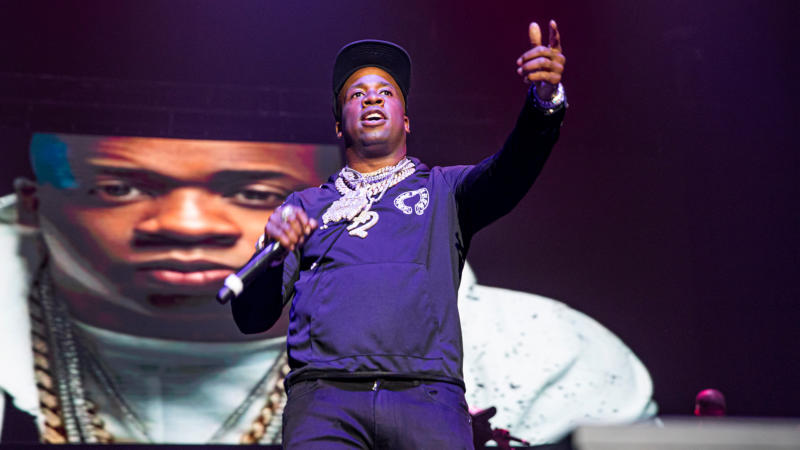If artists aren’t cautious, record labels may be able to “rake it up” off of the strength of a musician’s creativity.
Over the weekend, Memphis rapper Yo Gotti released his eleventh studio album “CM10: Free Game,” which includes 22 songs and additional releases from other artists including EST Gee, 42 Dugg, Moneybagg Yo, Kodak Black, Blac Youngsta, Shenseea, and 10Percent. Some fans have speculated that the recent project is actually the last album we’ll get from the rapper.
According to Complex, along with the release of the new project, Yo Gotti is allowing aspiring artists to record a verse on his latest track, “Dolla Fo’ Dolla.” He says that from there, the artist can do whatever they please with the new version of the song.
“You make the paper from it, I ain’t even trippin’,” he said regarding the news, which is through a partnership with Equity Distribution. “I own the masters of my record, I can do that shit for you. No label would ever do no sh-t like this.”
While this sounds like the ideal opportunity, AfroTech took a deeper look into Yo Gotti’s gift to upcoming rappers.
Is This Truly Beneficial?
As advertised, with Yo Gotti’s permission, artists can add a verse to the new song and do whatever they please with it — meaning their update of the song can be posted to digital streaming platforms such as YouTube, Apple Music, Spotify, TIDAL, etc. at no extra cost to the aspiring artist. In fact, according to a video announcement posted by Yo Gotti, artists will even be able to receive royalties from the track.
“PSA !! NEVER DONE BEFORE EVER EVERY ARTIST DAT PUT A VERSE ON “Dolla Fo Dolla” YOU CAN HAVE THE SONG,” wrote the entertainer via Instagram. “U CAN UPLOAD IT PUT IT ON YOUTUBE / DSP’S ( Apple, Spotify, Tidal etc ) AND U MAKE DA MONEY $ OFF it & USE IT TO GET IN POSITION …. I 100% OWN DA MASTER & IM GIVING YALL A UNIVERSAL CLEARANCE TO USE MY VERSE & THE SONG …”
At first glance, it seems as though the move will help young, hungry artists catch what could be their next big break and reach financial gains early on in their careers. However, there may actually be more to it than initially meets the eye.
The Submission Process
Artists aspiring to hop on Gotti’s song are referred to mydollafodolla.com, a site powered by Equity Distribution, Roc Nation’s indie distribution company. According to Equity’s website, their mission is simple, to help independent artists gain significant exposure through worldwide distribution while retaining ownership of their masters.
Through mydollafodolla.com, artists are asked to submit their name and email in order to receive further instructions from Equity about uploading their version of “Dolla Fo’ Dolla” to DSPs.
Once the information is received, Equity Distribution sends the artist an email with step-by-step instructions on uploading the music to their platform. While for some artists, this may not mean much, for those who may be more seasoned, they may question why they don’t have the freedom to use their own choice of distribution company — especially since Yo Gotti says he provided clearance to the song and that the artist can upload it themselves. He also mentions that the instructions are available. So, the song won’t be “taken down” –although one would suspect he was in full control of who received takedown notices as the owner of the song’s masters.
There is a plus side to using Yo Gotti’s recommended service, however. Equity Distribution appears to offer distribution at no cost to the artist. Some distributors offer a small fee for their services.
Questionable Instructions
While uploading your remix, the instructions seem pretty clear. However, looking closely at some of the wording, a few things stand out.

Artists are asked to list Equity Distribution as the label and in the C&P lines of the song’s metadata.
This may raise red flags considering this seems to be specific to “Dolla Fo’ Dolla” and Equity Distribution does not specifically suggest this in their standard upload instructions.
What is C & P?
In the music industry, © Copyright & ℗ Phonographic copyright (C&P), is a reference to the owners of your music/song.
According to RouteNote, the © owner owns the copyright of the music but not the sound recording itself. Spotify suggests that the © owner also retains the rights to the cover art, and possibly the underlying musical composition and lyrics.
The ℗ (phonographic) owner, however, owns the rights to the actual sound recording.
In short, once you upload your new remix to Equity Distribution, they not only act as your label but are the owners of your song.
Once a song is live, many companies will not allow the artist to go in and make changes to the C&P information. Therefore, it’s important that you know what this means at the time of submission.
But There's More..
Another cause of concern may come by way of the song’s very specific titling.
Equity suggests that submitters do not list Yo Gotti as the artist or as a Featured Artist. Instead, his name is only to appear in the song’s title as a “Yo Gotti Remix.”
Artists are told by Equity Distribution to title the song as follows:
“Dollah Fo’ Dollah Challenge (Yo Gotti Remix)”
While nothing major jumps out right away, some industry insiders feel that the use of “challenge” in the title, and referring to the song as a “Yo Gotti Remix” may legally allow your track to be labeled as a form of promotion — especially considering submitting the song was not actually part of an online challenge. Could this just be another way to promote Gotti’s new album?
Who Owns The Song?
This is the part of the submission process that gets tricky. Once you’ve completely entered your song’s metadata, you’re then prompted to complete the Ownership Assertion section.
According to CopyrightUser.org, the moral right to be identified as the author of a work does not arise until it has been asserted. So, who does Equity Distribution suggest that you list under the ownership section?
Yo Gotti. In fact, just Yo Gotti and no one else.

The company suggests listing Yo Gotti as 100% owner of the composition rights, while the submitter of the remix is told to notate 0% for themselves. Default rights to the song are often given to the creator or author of a song. These names are normally listed under lyricist or composer.
Equity notes that the artist will receive the royalties that are generated from their version of the song, and that Yo Gotti is simply the composition owner and is “taking no fee.” However, let’s take a look into how composition owners are paid in royalties vs. the artist listed as the performer.
So, Who Receives The Royalties?
There are two types of copyrights: recording and compositional (or publishing). We’ve already mentioned Equity retains ownership of the recording copyrights (C&P) and now we’ve discovered Yo Gotti retains ownership of the composition.
Now we will learn about the six types of royalty payouts:
- Streaming Royalties
- Neighboring Rights (and Royalties)
- Digital performance royalties
- Sync Licensing Fees
- Public Performance Royalties
- Mechanical Royalties
Owners of the Recording Copyrights can generate master recording royalties and digital performance royalties.
Master Recording royalties are achieved any time a song is downloaded, streamed, or physically purchased.
Digital Performance royalties are earned when the song is played on non-interactive streaming platforms like SiriusXM, Pandora, or similar.
Your distributor or label usually collects your master recording royalties and disperses them to the proper owners. In this case, Equity is listed as the owner. Your Digital Performance royalties are collected and dispersed by nonprofit collective rights organization, SoundExchange.
The owner of the compositional rights, in this case, Yo Gotti, can collect revenue from the remaining four royalty types: performance royalties (when the song is played on the radio or in a public setting), mechanical royalties, print royalties, and micro-sync royalties (when a song is used on Instagram, TikTok, and synced in Youtube videos). If the song is used in an ad or TV show, the compositional rights owner can also receive “sync” royalties.
This leaves us with the promise and fine print provided by Yo Gotti and Equity’s song submission process. The platform promises that Yo Gotti will not receive streaming royalties from platforms such as Spotify, TIDAL, Apple Music, which is true. However, it fails to mention the many different ways he will still be able to make money from your remix. The platform also banks on artists trusting that they’ll honor their word and disperse streaming royalties fairly, but, legally, the artist isn’t entitled to much.
The bright side per The MMF is that an artist or songwriter who assigns their rights may also, if successful, be able to renegotiate contracts at a later date giving them ownership or co-ownership — that’s if you have the financial resources and a good lawyer, of course.
The Lesson To Be Learned
Contests that are put out by record labels seem like the perfect option for musicians looking to make their next big break, but it is imperative to be aware of all of the fine details before submitting material.
While Yo Gotti did promise aspiring artists studio time, paid college tuition, and even money for commissary for those who are currently incarcerated and were able to participate in the initiative, the actual challenge may not be what you think.
Let this be a warning that everything that glitters may not be gold. So, you should always take time to read contracts and fine print before giving away your creativity.


